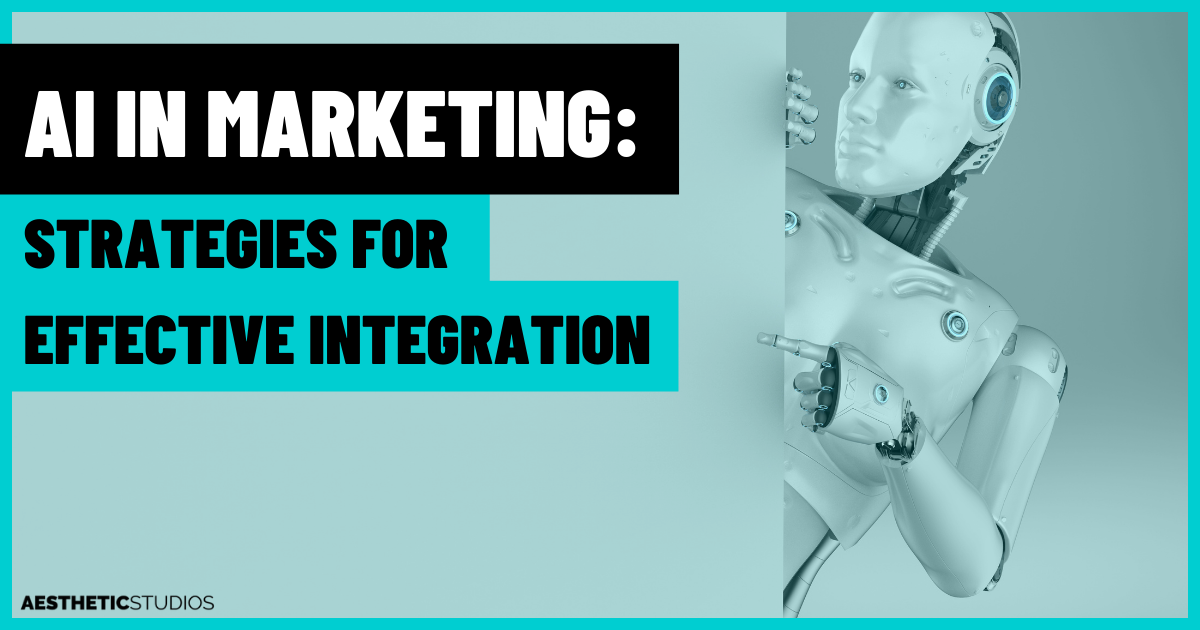Have you ever felt like you’re just scraping the surface of what’s possible with AI in your marketing campaigns? You’re not alone. Many marketers express feeling overwhelmed by the sheer complexity of AI tools and frustrated by the underwhelming results they sometimes deliver. If this sounds like you, I understand the struggle. Integrating AI into marketing isn’t just about deploying technology; it’s about harnessing its potential to truly transform your strategies and results.
As someone who has navigated the turbulent waters of digital marketing and AI integration across various industries, I bring a wealth of experience and a toolbox filled with practical solutions. In this article, you will discover not only the common challenges faced when adopting AI in marketing but also proven strategies to overcome them. By the end, you’ll have a clearer path forward to elevate your marketing efforts and achieve the results you’ve been aiming for.
Let’s dive into understanding the challenges and how you can turn them into opportunities to enhance your marketing effectiveness with AI.

Understanding AI in Marketing
What is AI in Marketing?
Artificial intelligence (AI) in marketing leverages a range of technologies such as machine learning models, natural language processing, and automation tools to refine and enhance marketing campaigns. These AI tools can range from sophisticated chatbots that improve customer interactions to advanced predictive analytics that anticipate future consumer behaviours and preferences. By analysing vast amounts of data and identifying patterns that may not be immediately apparent to human analysts, AI enables businesses to target their audiences more effectively and tailor their messaging to meet the unique needs and desires of individual customers.
AI also plays a pivotal role in content creation and management, optimising everything from email marketing campaigns to social media posts for maximum engagement. Furthermore, AI-driven recommendation engines can personalize website and shopping experiences, significantly boosting conversion rates and customer retention.
Why is AI Relevant in Marketing?
The relevance of AI in marketing transcends mere technological innovation; it represents a paradigm shift in how marketing strategies are developed and executed. AI’s ability to process and analyse data at scale provides marketers with unparalleled insights into consumer behaviour. This deep understanding allows for the creation of more effective marketing strategies that are not only reactive but also predictive, anticipating customer needs before they even arise.
Moreover, AI’s automation capabilities free up valuable time for marketing teams, allowing them to focus on more strategic tasks rather than getting bogged down by the minutiae of day-to-day operations. For example, AI can automate the A/B testing of different campaign messages, quickly identifying which versions perform best and adjusting strategies in real time to optimize marketing effectiveness.
Additionally, AI enhances the personalization of marketing efforts. In today’s market, personalization is not just preferred; it is expected. Consumers are more likely to engage with brands that understand their individual needs and preferences. AI makes this level of personalization possible at scale, enabling businesses to deliver tailored messages to the right audience at the right time on the right platform, thereby significantly enhancing the customer experience and increasing brand loyalty.

Common Challenges with AI in Marketing
1. Data Complexity and Quality Issues
One of the foundational challenges in implementing AI within marketing strategies is the quality and structure of the underlying data. AI systems thrive on large volumes of high-quality, well-structured data. Many businesses, however, have data that is fragmented across different systems, is inconsistently formatted, or is of dubious quality. This results in AI models that are poorly informed and produce unreliable or skewed outputs, leading to decisions that may not align with actual customer needs or market conditions. Additionally, the sheer volume of data required for effective AI can be daunting, and without robust data governance practices, the data lakes that feed AI systems can quickly turn into unmanageable data swamps.
2. Integration with Existing Marketing Strategies
Incorporating AI tools into pre-existing marketing frameworks is rarely straightforward. The integration often requires significant changes to existing workflows, which can disrupt ongoing operations and result in resistance from staff who are accustomed to traditional methods. Additionally, the initial phase of AI adoption can be marked by trial and error, requiring adjustments that some teams may find demoralising. Many marketing teams face a steep learning curve and may not initially have the internal processes or the agility needed to integrate AI effectively, which can delay seeing the benefits of AI investments.
3. Scalability and Cost Concerns
For small to mid-sized businesses in particular, the costs associated with AI can appear prohibitively high. The expense is not just in acquiring AI technology but also in maintaining and scaling it. Moreover, many AI solutions are marketed with enterprise-scale needs in mind, leading to a perception that they are not suitable for smaller operations. This can deter smaller businesses from adopting AI, even though there are increasingly more scalable AI solutions that can grow with a business. The challenge lies in identifying these scalable solutions and understanding how to implement them in a cost-effective manner that aligns with business growth.
4. Lack of Expertise
A significant hurdle many companies encounter is the scarcity of AI expertise within their marketing teams. AI requires a combination of skills in data science, analytics, and marketing that many current employees may not possess. This gap can lead to challenges in selecting the right AI tools, integrating them effectively, and optimising their use. Furthermore, the rapid pace of AI development means that continuous learning and adaptation are necessary to keep up with new technologies and methods. Without dedicated resources to train existing staff or hire new talent with the required skills, businesses might struggle to leverage AI to its fullest potential.
Practical Solutions to AI Challenges in Marketing
Simplifying AI Integration
Integrating AI into your marketing doesn’t have to be an all-or-nothing approach. Start small by selecting one or two AI functionalities that directly address your most pressing marketing challenges. This could range from automating routine tasks like social media posting to implementing more complex systems such as a Customer Data Platform (CDP). A CDP can leverage AI to unify and analyse vast amounts of customer data from various sources, providing actionable insights that can enhance customer engagement and personalise experiences. By starting small, you can manage the impact on your existing operations and allow your team to adapt to new workflows gradually.
Training for Teams
A crucial step in overcoming the challenges of AI in marketing is to upskill your team. Investing in training not only helps in the practical use of AI tools but also in understanding the underlying data science. This dual focus will equip your team to make informed decisions about which tools are most appropriate for your goals and how to leverage them effectively. Training should be ongoing to keep pace with the rapid advancements in AI technology, ensuring your team remains competent and confident in using AI-driven tools.
Selecting the Right Tools
Choosing the right AI tools is essential for effective integration. It’s important to select tools that not only meet your current needs but also grow with your business. This means considering solutions that offer scalability and flexibility in terms of pricing and capabilities. For small to mid-sized businesses, it is particularly important to choose AI solutions that provide high value without the high costs typically associated with enterprise-level tools. Additionally, the chosen AI tools should integrate seamlessly with your existing marketing platforms to enhance their effectiveness and minimise disruption to your operations.
Building a Collaborative AI Strategy
Develop a strategy that incorporates AI into your marketing while fostering collaboration across your organisation. By involving various teams from the outset: such as IT, data analytics, and customer service, you can ensure that AI tools are integrated in a way that supports all aspects of your business. Collaboration also helps in identifying which aspects of your marketing can benefit most from AI, ensuring that the technology aligns with broader business objectives.
Monitoring and Adapting
Finally, it is crucial to continuously monitor the performance of AI integrations and be willing to make adjustments. AI is not a set-it-and-forget-it solution but rather a dynamic tool that needs tweaking and refinement to align with changing marketing goals and market conditions. Regularly reviewing the outcomes of your AI initiatives will help you understand their impact and refine your approach to maximise benefits.

Case Studies: Real-World Applications of AI in Marketing
Implementing AI Chatbots for Customer Service
A mid-sized retail company was facing challenges with managing high volumes of customer inquiries, which often led to delayed response times and reduced customer satisfaction. To address this, they implemented an AI-driven chatbot on their website. The chatbot was designed to handle routine inquiries such as product questions, order status updates, and basic troubleshooting, which previously occupied a significant portion of the customer service team’s time.
Results:
Reduced Response Times: The chatbot provided instant responses to common questions, dramatically reducing average response times from several hours to mere seconds.
Increased Staff Efficiency: With the chatbot handling routine queries, the customer service staff were able to focus on more complex issues, improving the overall quality of service.
Enhanced Customer Satisfaction: The immediate and 24/7 availability of assistance through the chatbot led to an improvement in customer satisfaction scores.
Operational Efficiency: The implementation of the chatbot resulted in a noticeable reduction in operational costs associated with customer service.
Adopting AI for Targeted Email Marketing
Another example involves a small online bookstore that used AI to enhance its email marketing campaigns. The bookstore utilised AI algorithms to analyse customer purchase history and browsing behaviour to create highly personalised email content.
Results:
Increased Open Rates: By sending tailored book recommendations and offers, the bookstore saw an increase in email open rates by 40%.
Higher Conversion Rates: Personalised emails resulted in a 35% increase in click-through rates and a significant boost in conversion rates as customers were more likely to find the content relevant.
Customer Retention: The personalised approach not only attracted new customers but also significantly improved retention rates among existing customers.
Optimising Product Recommendations with AI
A large electronics retailer integrated AI into their online platform to optimise product recommendations. By using machine learning algorithms, the system could predict and suggest products based on the individual customer’s past purchases and browsing habits.
Results:
Personalised Shopping Experience: Customers received recommendations that felt more relevant and tailored to their specific interests and needs.
Increased Sales: The personalised recommendations contributed to an increase in average order value as customers were more likely to add additional, relevant items to their cart.
Enhanced Customer Loyalty: The personalised approach helped in building stronger customer relationships, enhancing loyalty and repeat business.
These case studies demonstrate the tangible benefits of integrating AI into marketing strategies. Whether it’s through improving customer service, enhancing email marketing effectiveness, or personalising product recommendations, AI can significantly impact various aspects of marketing.

So, What’s Next?
Embracing AI in marketing indeed comes with a unique set of challenges, yet the potential rewards far outweigh the initial hurdles. By adopting a strategic approach: starting small, committing to continuous education, and selecting tools that align with your business needs, you can effectively navigate the complexities of AI. This proactive approach will not only help you overcome these challenges but will also significantly amplify your marketing efforts.
Remember, integrating AI into your marketing strategies is a marathon, not a sprint. It requires patience, persistence, and a commitment to continuous learning and adaptation. The landscape of AI is ever-evolving, and staying abreast of new technologies and techniques will keep your business at the cutting edge. By embracing these principles, you set the stage for sustained success, ensuring that your marketing strategies remain dynamic, responsive, and, most importantly, effective.
The journey toward AI proficiency may seem daunting, but with the right mindset and strategies, the path will lead to improved efficiencies, deeper customer insights, and a more engaging customer experience. So, take the first step today, and start unlocking the full potential of AI in your marketing efforts. Read more about AI by learning about OpenAI Playground. If you made it this far, you deff want to check out our Top 19 AI Chatbot List.



